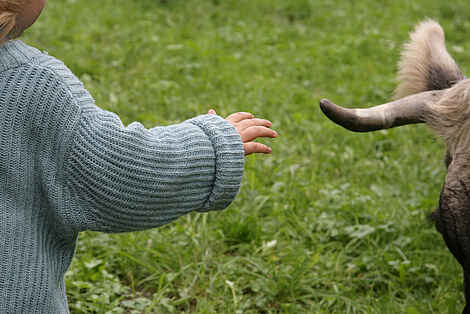Since the second half of the 20th century, the incidence of allergic diseases such as asthma and allergies has risen significantly throughout Europe, leading to a discussion about its connection to the changes in our environment [1]. What is known as the Hygiene Hypothesis states that the more sterile the environment in which children grow up, the higher is the risk that they will develop an allergic disease. On the other hand, cross-sectional studies show that the specific environment of dairy farms lowers the risk of allergies. In order to examine this hypothesis, as part of the PASTURE cohort study (Protection against Allergy – Study in Rural Environments), 1,000 children were studied over the last 15 years. The children came from rural areas in five European countries (Germany, Austria, Switzerland, Finland and France). 500 of the children lived on farms, while the others had no direct contact to farms. Data on the lifestyle of the mothers and children were recorded using questionnaires and diaries and immunological and microbial parameters monitored from blood and stool samples [2].
The results show that being exposed to a range of animals, microorganisms and foods is a major factor in the development of the immune system. Children who grow up on a farm and occasionally spend time in the cowshed are far less likely to develop asthma and allergies. They also exhibit lower blood counts of the specific IgE antibody that plays a key role in allergic diseases. There are two clear influencing factors: first the very early contact with an agricultural environment and the animals, and second consuming raw cow’s milk, even during pregnancy and the first year of life [2]. Children who drink raw cow’s milk from their first year of life exhibit a significantly lower risk of colds, respiratory infections, middle ear infections and fevers than children who drink pasteurised or ultra-heat-treated milk. The protective effect of raw milk consumption rises steadily up to the age of three and then remains constant. There are further studies that show that the consumption of raw cow’s milk can provide protection against allergies [3].
The development of a healthy immune systems requires natural contact to the living environment with its viruses, bacteria and pathogens. In this way the immune system learns to react appropriately to outer stimuli, including infections. But this only happens if the environment is diverse and stimulating, as is the case on a farm. The first years of life, when the gut microbiota is forming, are especially crucial in this respect. We have long been aware of the importance of the gut microbiota for human health. Raw cow’s milk, being a living food, contains all its valuable natural substances. Even though the consumption of raw milk cannot be unconditionally recommended due to possible bacterial contamination, it appears to play a crucial role in the development of a healthy immunity.
Bibliography
[1] https://www.asept.org/nos-thematiques-de-recherche/risques-respiratoires/pature.html, accessed on 07.06.2024
[2] Illi S, von Mutius E, Neuherberg (2018): “Die PASTURE-Geburtskohorte” in Gesellschaft
pädiatrische Allergologie: Pädiatrische Allergologie, Issue 4 https://www.gpau.de/fileadmin/user_upload/GPA/dateien_indiziert/Zeitschriften/Paed_Allergologie_2018_4.pdf, accessed on 07.06.2024
[3] Bachmann H-P, Fröhlich M-T, Bisig W (2020): Rohmilch und Rohmilchprodukte beeinflussen die menschliche Gesundheit – eine Literaturbesprechung. Argarforschung Schweiz, 11(124-130)
doi.org/10.34776/afs11-124
